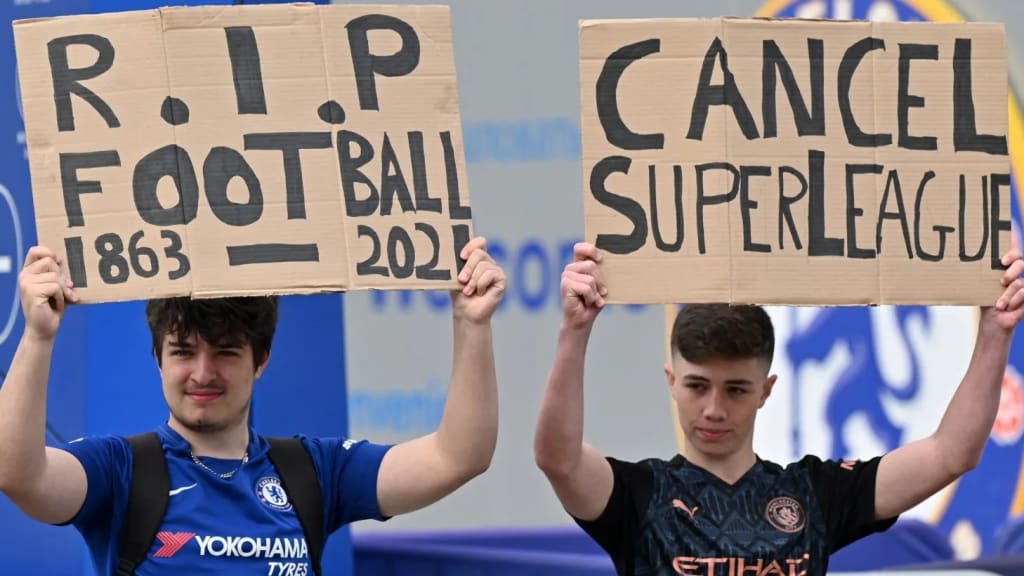Why the European Super League Isn't Going Away
Is the European Super League Inevitable?

While Brighton’s 0-0 draw at Chelsea on April 20th, 2021 was a largely uneventful affair, it remains synonymous with the fan uprising and protests that followed the announcement of the European Super League.
It also came against the backdrop of uncertainty and confusion, as furious protests outside of Stamford Bridge were only partially assuaged by speculation that the Blues were set to become the first English club to withdraw from the proposed breakaway competition.
The remainder of English football’s so-called “big six” clubs soon followed suit, while the entire project had collapsed within a matter of hours.
However, plans to create a European Super League remain ongoing, and the recent Champions League expansion has done little to quell interest among investors or Europe’s tip clubs. But this is a formality, and why is the ESL an idea that refuses to go away?
At the Heart of the European Super League
Of course, the initial reaction of grassroots clubs and fans to the European Super League was as authentic as it was visceral. This is understandable, with the idea of closed competition and seemingly endless greed alien to anyone who has ever started a team at grassroots levels.
However, the objection from some pundits and football’s governing bodies was at least partially inspired by cynicism. After all, UEFA faced the prospect of their Champions League cash cow being significantly devalued if it were to be replaced by the ESL, with this tournament generating an estimated £2.8 billion as recently as 2020/21.
In contrast, the European Super League project was valued at an incredible £4.6 billion, with the 12 confirmed participating clubs destined to share this and determine how it’s distributed.
UEFA is also acutely aware that the European Super League project is inspired in part by a desire to replace them as the overseer of continental football. This is certainly an ambition of Perez, who believes that UEFA is responsible for the growing inequity that exists in European football and the chasm between the Premier League and the richest non-English sides.
Ultimately, the Super League represents the battle between UEFA and those who seek to undermine their influence and alter the landscape of European football, and this battle will continue to rage no matter what form it may take.
A Glance at the New Look Super League
The sheer value of this competition and its threat to European football’s existing structures means that it can never fully be shelved, especially with Real Madrid President Florentino Perez (who was the perceived brains behind the project) still highly motivated and influential.
Remember, during initial planning for the Super League, Perez was able to generate significant interest from American investment giant JP Morgan Chase. The banking behemoth pledged around $5 billion to the league’s formation, while other investors were expected to get involved ahead of the competition.
It should therefore come as no surprise that a new and improved Super League proposal has since been drafted, with this having been recently unveiled by the sports management brand A22.
While this offered little in the way of specifics, it did suggest that between 60 and 80 teams would be involved in four tiers of competition, allowing for promotion and relegation (unlike the previous iteration) and enabling sides to qualify through their domestic league performance as they do in the Champions League.
In terms of guaranteeing participants’ revenue, teams would be sure to play a minimum of 14 matches per season, making it a viable and profitable endeavour for everyone involved.
The Last Word
While this vague proposal needs some flesh put on the bones, it does seem to tackle some of the main criticisms aimed at the initial project. Most importantly, it allows for fair and open competition, with teams able to qualify on merit and required to play well if they’re to retain their place.
The competition also appears to offer a more radical expansion of European football, even when compared to UEFA’s new Champions League proposals. These will see the UCL group stage extended ahead of the 2024/25 season, as the number of participating teams rises from 32 to 36 and participating sides play eight initial matches over 10 weeks.
Because of its more open nature (and the fact that the new ESL may be more accessible to a wider range of teams), such proposals may benefit from increased appeal among fans, including those outside of English footballs’ top six. Of course, it’s almost certain that the original 12 Super League clubs will want to retain control over the money generated by the competition, which is why more detailed plans must be laid out before we can glean too much more.
Regardless, this stealth battle between UEFA and its most determined critics will continue at length, for as long as financial inequality between the top five leagues remains and the governing body continues to divert money out of club owners’ pockets.
The irony is, of course, that both UEFA and the ESL pioneers believe that greed is destroying European football, and continues to do so with every passing year. The difference is that both are pointing fingers at one another, while taking steps that they think will reduce perceived wealth inequality on the continent and guarantee their own futures.






Comments
There are no comments for this story
Be the first to respond and start the conversation.